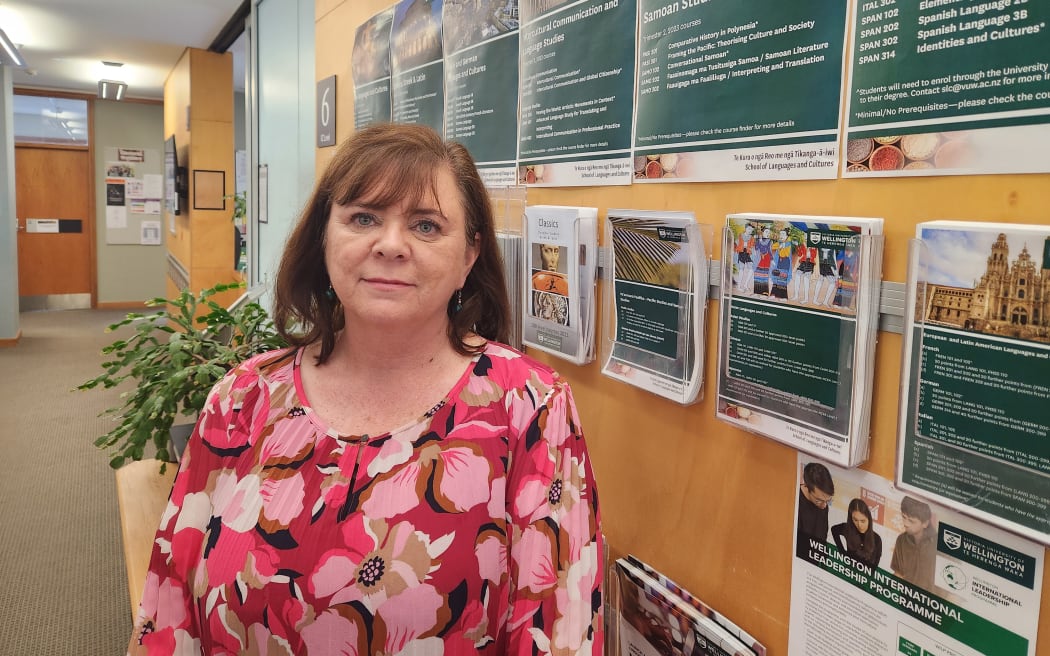
Universities could be left competing for enrolments in just four languages, Nicola Gilmour says. Photo: RNZ / John Gerritsen
Academics warn university language cuts threaten New Zealand's economic and strategic interests.
German and Italian have been targeted for cuts and lecturers worry more popular languages like Japanese, Spanish, Chinese and French will eventually come under threat too.
Victoria University School of Languages and Cultures head Dr Nicola Gilmour said learning another language was beneficial for individuals but it was also good for the country.
"We can rely on interpreters from other countries but we need people whose interests are aligned with New Zealand, whose loyalties are aligned with New Zealand and who understand what New Zealand needs," Gilmour said.
Countries like China and Germany were particularly important for New Zealand in terms of trade and strategic interests, she said.
However, enrolments in international languages had been falling.
In 2021, 980 full-time equivalent students studied a language other than Māori or New Zealand Sign Language at university, down from 1555 nine years earlier.
Among the worst hit were German, falling from 120 full-time equivalents to 40, and Italian which dropped from 105 to just 20.
Japanese had the most students in 2021 with 300 full-time equivalents followed by Spanish with 155, French had 125 and Chinese 110.
As a result, Otago University had decided to cut German and Victoria University had proposed dropping German, Italian, Greek and Latin.
Gilmour said universities could be left competing for enrolments in just four languages - Japanese, Spanish, French and Chinese, and even they might not be viable in the longer term.
"I would really like to think we could hang on to at least those four but I just fear that if we're all chasing after the same group of students then sooner or later I think it's going to become unsustainable at different institutions," she said.
Auckland University School of Cultures, Languages and Linguistics head Professor Martin East said Victoria and Otago's plans would affect the entire country.
"The implications of the cuts being proposed at the moment are actually a national issue rather than a local issue for any particular university. As individual universities make decisions to cut back on what they are offering we see an eroding of the discipline area, we see fewer and fewer opportunities for students to be able to take up language study," he said.
Universities needed to work together to maintain language courses, he said.
"I think that languages are probably not sustainable in New Zealand if they're taught by too many institutions. But I believe that it's by working together more proactively that we can deliver and sustain more robust programmes," he said.
But it was not clear if anything would happen in time to save the courses that were under threat.
At Otago University, associate professor Antonie Alm said management had already approved the decision to cut German.
She said universities should hang on to their language courses despite declining enrolments.
"It's really very important for New Zealand to keep the doors open towards European languages. There might be a trend that fewer students are enrolling in languages because there's another focus or another trend, but just being guided by those trends I think is a mistake for a university," she said.
"As universities our duty is to offer education and offer a holistic education and languages should be part of that. You should have those choices at an international university."
Enrolments in German in Dunedin high schools were up, but axing the language from Otago and Victoria universities was likely to deter teenagers from studying it, she said.
"Politically, economically, Germany is an important player for New Zealand so for that reason alone I think we should keep it."
The Italian ambassador to New Zealand Francesco Calogero said he was very sorry that Victoria might stop teaching Italian and he hoped the university would reconsider its decision.
"We will continue to support in the future any institution engaged in the teaching of Italian language as we believe that there is a high demand for it across New Zealand," he said.
Anglophone arrogance?
Universities blame an indifferent school system and general English-speaking disinterest in language learning for their falling language enrolments.
Over the years, various universities had dropped languages including Russian, Indonesian, Portuguese and Arabic.
The seven universities now offered Chinese, Japanese, Korean, Spanish, French, German, Italian, Portuguese, Russian, Ancient Greek, Latin, and Samoan, but not always as major subjects and some, such as Russian, and Korean were available at only one university.
Martin East said New Zealanders often regretted not learning a language when they travelled overseas.
"In New Zealand where we are so far away from the rest of the world we can become complacent. We can perceive ourselves as thinking English is enough, we don't need to be learning other languages to engage on the world stage," he said.
Other English-speaking countries were struggling to maintain their language courses too, he said.
Nicola Gilmour said language enrolments fluctuated. Spanish for example had been seen as a cool subject in the early 2000s.
"That kind of idea of learning a language being cool has dissipated," she said.
Gilmour said some secondary schools discouraged students from taking international languages and school guidance counsellors sometimes advised school leavers not to continue their language study at university.
Antonie Alm said universities also had to adapt to the rise of language learning apps.
"There are more opportunities to learn a language informally but a university needs to adapt to those circumstances," she said.
"If languages can be learned through apps or through online courses, our university course should reflect that as well."






